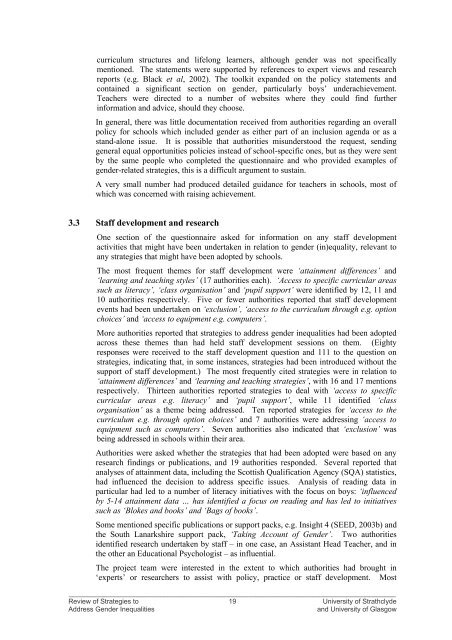Review of Strategies to Address Gender Inequalities in Scottish ...
Review of Strategies to Address Gender Inequalities in Scottish ...
Review of Strategies to Address Gender Inequalities in Scottish ...
You also want an ePaper? Increase the reach of your titles
YUMPU automatically turns print PDFs into web optimized ePapers that Google loves.
curriculum structures and lifelong learners, although gender was not specificallymentioned. The statements were supported by references <strong>to</strong> expert views and researchreports (e.g. Black et al, 2002). The <strong>to</strong>olkit expanded on the policy statements andconta<strong>in</strong>ed a significant section on gender, particularly boys’ underachievement.Teachers were directed <strong>to</strong> a number <strong>of</strong> websites where they could f<strong>in</strong>d further<strong>in</strong>formation and advice, should they choose.In general, there was little documentation received from authorities regard<strong>in</strong>g an overallpolicy for schools which <strong>in</strong>cluded gender as either part <strong>of</strong> an <strong>in</strong>clusion agenda or as astand-alone issue. It is possible that authorities misunders<strong>to</strong>od the request, send<strong>in</strong>ggeneral equal opportunities policies <strong>in</strong>stead <strong>of</strong> school-specific ones, but as they were sentby the same people who completed the questionnaire and who provided examples <strong>of</strong>gender-related strategies, this is a difficult argument <strong>to</strong> susta<strong>in</strong>.A very small number had produced detailed guidance for teachers <strong>in</strong> schools, most <strong>of</strong>which was concerned with rais<strong>in</strong>g achievement.3.3 Staff development and researchOne section <strong>of</strong> the questionnaire asked for <strong>in</strong>formation on any staff developmentactivities that might have been undertaken <strong>in</strong> relation <strong>to</strong> gender (<strong>in</strong>)equality, relevant <strong>to</strong>any strategies that might have been adopted by schools.The most frequent themes for staff development were ‘atta<strong>in</strong>ment differences’ and‘learn<strong>in</strong>g and teach<strong>in</strong>g styles’ (17 authorities each). ‘Access <strong>to</strong> specific curricular areassuch as literacy’, ‘class organisation’ and ‘pupil support’ were identified by 12, 11 and10 authorities respectively. Five or fewer authorities reported that staff developmentevents had been undertaken on ‘exclusion’, ‘access <strong>to</strong> the curriculum through e.g. optionchoices’ and ‘access <strong>to</strong> equipment e.g. computers’.More authorities reported that strategies <strong>to</strong> address gender <strong>in</strong>equalities had been adoptedacross these themes than had held staff development sessions on them. (Eightyresponses were received <strong>to</strong> the staff development question and 111 <strong>to</strong> the question onstrategies, <strong>in</strong>dicat<strong>in</strong>g that, <strong>in</strong> some <strong>in</strong>stances, strategies had been <strong>in</strong>troduced without thesupport <strong>of</strong> staff development.) The most frequently cited strategies were <strong>in</strong> relation <strong>to</strong>‘atta<strong>in</strong>ment differences’ and ‘learn<strong>in</strong>g and teach<strong>in</strong>g strategies’, with 16 and 17 mentionsrespectively. Thirteen authorities reported strategies <strong>to</strong> deal with ‘access <strong>to</strong> specificcurricular areas e.g. literacy’ and ‘pupil support’, while 11 identified ‘classorganisation’ as a theme be<strong>in</strong>g addressed. Ten reported strategies for ‘access <strong>to</strong> thecurriculum e.g. through option choices’ and 7 authorities were address<strong>in</strong>g ‘access <strong>to</strong>equipment such as computers’. Seven authorities also <strong>in</strong>dicated that ‘exclusion’ wasbe<strong>in</strong>g addressed <strong>in</strong> schools with<strong>in</strong> their area.Authorities were asked whether the strategies that had been adopted were based on anyresearch f<strong>in</strong>d<strong>in</strong>gs or publications, and 19 authorities responded. Several reported thatanalyses <strong>of</strong> atta<strong>in</strong>ment data, <strong>in</strong>clud<strong>in</strong>g the <strong>Scottish</strong> Qualification Agency (SQA) statistics,had <strong>in</strong>fluenced the decision <strong>to</strong> address specific issues. Analysis <strong>of</strong> read<strong>in</strong>g data <strong>in</strong>particular had led <strong>to</strong> a number <strong>of</strong> literacy <strong>in</strong>itiatives with the focus on boys: ‘<strong>in</strong>fluencedby 5-14 atta<strong>in</strong>ment data … has identified a focus on read<strong>in</strong>g and has led <strong>to</strong> <strong>in</strong>itiativessuch as ‘Blokes and books’ and ‘Bags <strong>of</strong> books’.Some mentioned specific publications or support packs, e.g. Insight 4 (SEED, 2003b) andthe South Lanarkshire support pack, ‘Tak<strong>in</strong>g Account <strong>of</strong> <strong>Gender</strong>’. Two authoritiesidentified research undertaken by staff – <strong>in</strong> one case, an Assistant Head Teacher, and <strong>in</strong>the other an Educational Psychologist – as <strong>in</strong>fluential.The project team were <strong>in</strong>terested <strong>in</strong> the extent <strong>to</strong> which authorities had brought <strong>in</strong>‘experts’ or researchers <strong>to</strong> assist with policy, practice or staff development. Most______________________________________________________________________________________<strong>Review</strong> <strong>of</strong> <strong>Strategies</strong> <strong>to</strong> 19 University <strong>of</strong> Strathclyde<strong>Address</strong> <strong>Gender</strong> <strong>Inequalities</strong>and University <strong>of</strong> Glasgow
















